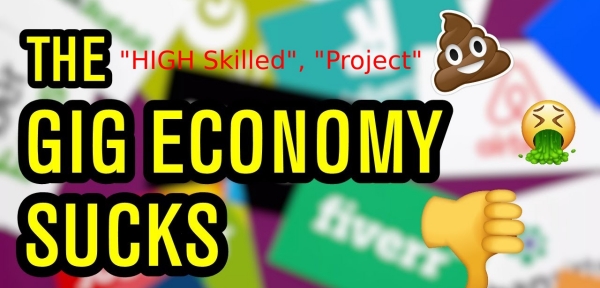Project Economy? Count me perplexed
What is a “project”, in THIS economy?

<u><em><strong>CAPTION:</strong>
<a href="https://www.youtube.com/watch?time_continue=4&v=EYMXiPzjQ2M&feature=emb_logo" target="_blank">Source: Gig Economy Sucks</a>
</em></u>
A Business School professor believes, if I understand him correctly, that “it’s time the gig economy had its own transformation” into a “project economy”. He recently said that project economy has been “growing among high-skilled freelancers and has even overtaken the gig economy”.
He points out that “this type of project-based freelance work adds significant value to companies, which makes these freelancers more attractive”.
What is the “project economy” anyway?
“Project economy” would basically mean every case where (emphasis mine) “companies can hire more specialised skills for a set amount of time or for a set project instead of taking on full-time staff”.
This way of working “enables companies to manage risk as they scale up, while also protecting the employees they already have" (emphasis mine, again).
The freelance model of the project economy means that “businesses can treat the uncertain growth period as a series of projects for which they can hire freelancers. If those projects turn out to be more sustainable, the freelancers can then be replaced by permanent employees."
“In fact those employees, their jobs wouldn’t exist without the freelancers because the company they work for would find the risk too high to grow. In a sense, it breaks some of the myth that people often view that freelancers actually take away the jobs of employees".
“They do in the gig economy, in particular the low-skill sector, but in the project economy and a lot of the areas in which freelancers add value, [it] actually creates employment.”
The conclusion? Also thanks to the increase in remote working after COVID-19 “In the high-skill sector, freelance work and project-based management are not just here to stay but will drive into the future."
Nothing new here, please gig along?
If I understand the professor’s point correctly, there is little to be happy about here, and little that is new too.
From what I see around me, much of this “Project Economy” consists of jobs that are just as dead-end, unflexible and precarious as delivering pizza with your own car. Project Economy seems just the same gig economy to me, just for high-skilled people (not to mention how many high-skilled people already cornered into delivering pizza).
Also, there is nothing new here at all. As in many other cases, COVID-19 is only accelerating, or making more visible, trends that were going on for years. Just ask “X”.
REAL story of “X”, a REAL Project Economy, high-skilled worker
Let me introduce you to “X”. “X” is the collective name for five or six real friends of mine, all with PhD-level education, all with many years of experience in the telecom hardware industry. These days, every one of those “X” is, in perfect Project Economy fashion, working full time, freelance, for the same COMPANY.
In this period, for all practical purposes, “X” is a regular, full-time employee of COMPANY: he cannot set his own working hours, schedule, priorities, deadlines or vacation days. He has a boss who decides that for him, a boss who is a regular employee of COMPANY. The only thing that COVID-19 changed for “X” is that the pandemic forced the boss to let “X” work remotely, as he could have already done before, without any meaningful impact on his performances.
Perfect Project Economy here, right? Yes, with just one little trick, or untold truth, in this, and surely countless other equally real stories:
“X”, that is every one of those 6/7 really high-skilled friends of mine, have been working like that for COMPANY, every day, since mid 2008. Yes, that is “Two Thousands and Eight, almost thirteen years ago. Why “mid 2008”?
Because that’s exactly when COMPANY, the same corporation that pays them now, fired “X” and many more of its regular employees, some of whom COMPANY had hired in the 90s. In mid 2008, discovering that indian engineers looked cheaper, COMPANY abruptly sent “X” away, just to hire him as consultant 6 months later, when COMPANY acknowledged that it was too expensive and risky to do without “X” skills, and knowledge of COMPANY’s processes and product lines.
It is almost thirteen years now that every one of those “X”, lives with:
- all the lack of freedom and dependence from one source of income that comes from being a high skilled white collar employee of a big COMPANY, under the same bosses one can’t escape from…
- AND, with all the fiscal, logistic, managerial and psychological ballast that comes from being a freelancer moving from one six-month contract to another
Almost thirteen years. Before getting all excited about “Project Economy”, remind that many “Project Economy Freelancers” are not opportunities for a company to stay afloat until it can hire more employees. They are previous employees, first kicked out of the door, then left chained right outside that door.
If you are one of those employees, and would like to share your story with a guest post here, just contact me!
Who writes this, why, and how to help
I am Marco Fioretti, tech writer and aspiring polymath doing human-digital research and popularization.
I do it because YOUR civil rights and the quality of YOUR life depend every year more on how software is used AROUND you.
To this end, I have already shared more than a million words on this blog, without any paywall or user tracking, and am sharing the next million through a newsletter, also without any paywall.
The more direct support I get, the more I can continue to inform for free parents, teachers, decision makers, and everybody else who should know more stuff like this. You can support me with paid subscriptions to my newsletter, donations via PayPal (mfioretti@nexaima.net) or LiberaPay, or in any of the other ways listed here.THANKS for your support!